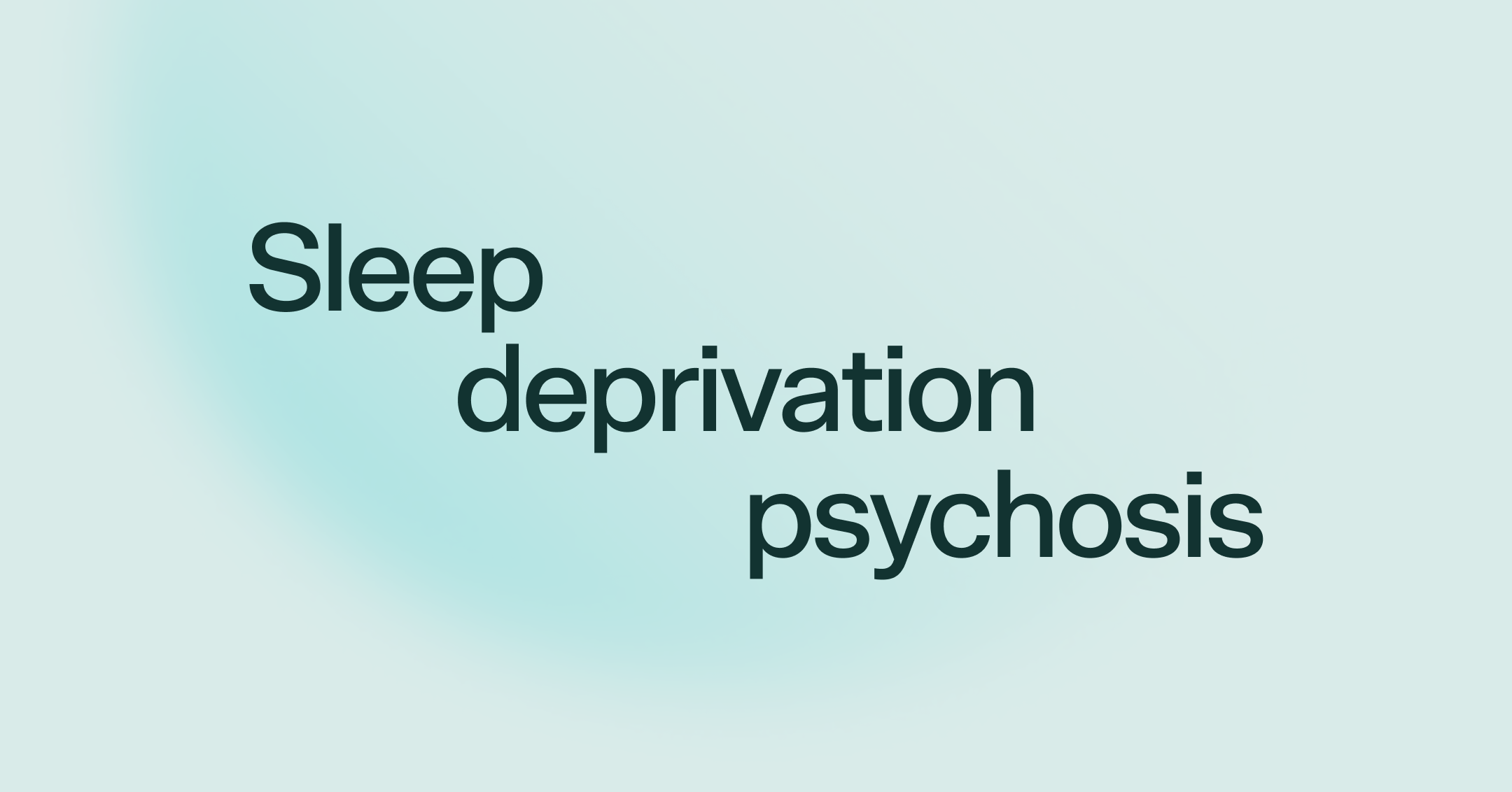Ongoing sleep deprivation can lead to serious psychiatric concerns like hallucinations and delusions. This experience is referred to as sleep deprivation psychosis.
Left untreated, sleep deprivation can contribute to mood and memory problems, behavioral changes, an increased risk of self-harm, and more.
Many people can recover from psychiatric symptoms caused by sleep deprivation psychosis by getting more rest. Improving your sleep habits and environment can support better sleep quality and overall well-being.
Most of us know what it feels like to wake up after a poor night’s sleep. You might feel groggy or irritable throughout the day and may have a harder time focusing on tasks. This is because our brains and bodies need enough sleep to recuperate and recharge.
Sleep deprivation can significantly impact our well-being in many ways. When your sleeplessness is chronic and severe, it can create serious psychiatric concerns. Research shows that going without sleep for long periods of time can lead to something called sleep deprivation psychosis. While not an official diagnosis, this term refers to the temporary, psychotic-like symptoms (ie.hallucinations and delusions) that can occur due to lack of sleep.
The good news is these symptoms can often be reversed. Many people recover with consistent, restful sleep, and better sleep habits can improve mental health. Therapy can also help with stress, anxiety, or habits impacting your sleep, making it easier to get the rest your body and mind need.
Symptoms of sleep deprivation psychosis
Psychosis is a symptom of serious mental health conditions like schizophrenia and bipolar disorder. It occurs when a person senses something that isn’t really there (hallucinations) or believes something that isn’t true (delusions).
Going without sleep for long periods of time can negatively affect the mind and body in many ways. In severe cases, it can lead to sleep deprivation psychosis. This occurs when a person experiences hallucinations, delusions, or both due to a lack of sleep.
You don’t need to have a psychotic disorder to experience sleep deprivation psychosis. If you’re having trouble sleeping and experiencing any of the following symptoms, don’t hesitate to seek professional help.
Mood changes like aggression, anger, hostility, apathy, anxiety, and depression
Increased confusion and difficulty concentrating
Slurred or disorganized speech
Memory loss
Trouble with motor coordination
Dissociation and depersonalization (feeling like you’re living in a dream or that you’re not really “there”)
Distorted sense of time
Odd or unusual thoughts or beliefs
Hallucinations like seeing, hearing, tasting, sensing, or smelling things that aren’t really there
The care you need, when you need it
Learn how Rula can support your mental health journey
How lack of sleep can cause psychosis
Sleep deprivation psychosis is difficult to study. Today, it’s considered unethical to deprive research subjects of sleep for longer than 48 hours. However, in reviewing historical data, it appears that going without sleep for just one night can elicit psychotic symptoms in some people.
These symptoms may get worse the longer someone goes without sleep. But, unlike the psychosis that can occur due to a mental health condition like schizophrenia, sleep deprivation psychosis will typically subside once someone gets adequate rest.
Given that there’s an established connection between sleep dysfunction and psychotic disorders, some experts have wondered if sleep disturbance can lead to conditions like schizophrenia. However, we don’t have reliable data to support a causal relationship between sleep deprivation and psychotic disorders.
Dig deeper:
Effects of sleep deprived psychosis
Psychosis — whether due to a lack of sleep or a psychotic disorder — may lead to:
A loss of motivation
Mood disturbance
Emotional dysregulation
An inability to function in daily life
Agitation or difficulty regulating behavior
An increased risk of self-harm and/or suicidality*
Fortunately, research suggests that these symptoms won’t last forever. Sleep deprivation psychosis often resolves after a period of normal sleep.
One study found that for some people, symptoms subsided after just one night’s rest. But other people may need about 50% of the total time they had been awake to recover from the deprivation period. For example, if they were awake for 100 hours, they’d need 50 hours of sleep to recover. The same study found that if sleep deprivation psychosis didn’t subside after a period of adequate rest, it was likely due to the presence of an underlying mental health condition.
*A note on safety: If you or a loved one is in emotional distress or a suicidal crisis, don’t hesitate to call or text 988. The 988 Suicide and Crisis Lifeline provides 24/7, confidential support with trained crisis counselors.
Recovering from sleep deprivation psychosis
If you’re experiencing sleep deprivation psychosis (and a mental health professional has determined that it’s not due to another mental health concern), improving your sleep habits and environment can help you recover. Therapy can also be a helpful tool in addressing underlying stress, anxiety, or cognitive patterns that may be impacting your sleep.
Here are a few tips to help you get started:
Create a consistent schedule. Try to go to bed and wake up at the same time each day — even on the weekends.
Limit screen time. Avoid using your phone or watching TV in the hours before going to bed. The blue light can mimic daylight and impact your brain’s ability to rest.
Make your sleep space comfortable. If possible, use light-blocking window treatments, keep noise to a minimum, and invest in some comfortable bedding. You might also find comfort in the use of a fan or white noise machine and keeping the room at a moderate temperature.
Create a nighttime routine. Repeating the same steps each night before bed (i.e. brushing your teeth, tidying up your space, reading a book) will help signal to your brain that it’s time for rest.
Consider your daytime habits too. Spending time outside in the fresh air and making time for daily exercise can make it easier to fall and stay asleep at night.
In addition to creating healthy sleep habits, therapy — especially cognitive behavioral therapy for insomnia (CBT-I) — can help address any underlying issues that may be interfering with your sleep. CBT-I focuses on changing unhelpful thoughts and behaviors that impact sleep, supporting both short- and long-term recovery.
I’d recommend establishing a consistent sleep schedule, limiting screen time before bed, and creating a calming bedtime routine. Taking small steps to improve sleep habits, along with seeking support from a therapist, can help reduce the risk of psychotic symptoms and improve overall well-being.

Brandy Chalmers, LPC
Clinical reviewer
Find care with Rula
A lack of sleep can take a serious toll on your mental health and physical well-being. But when it’s severe and ongoing, it can lead to psychotic symptoms like hallucinations and delusions. This experience is referred to as sleep deprivation psychosis and fortunately, many people can recover after returning to a normal sleep schedule. However, others may need professional help to address sleep deprivation psychosis and any underlying mental health concerns.
At Rula, we’re committed to delivering a comprehensive behavioral health experience that helps people feel seen and understood so they can get back to feeling their best. Rula makes it easier to find a licensed therapist or psychiatric provider who accepts your insurance so you don’t have to choose between affordable care and excellent care. With a diverse network of more than 15,000 providers, 24/7 crisis support, and appointments available as soon as tomorrow, we’re here to help you make progress — wherever you are on your mental health journey.
Rula's editorial process
Rula's editorial team is on a mission to make science-backed mental health insights accessible and practical for every person seeking to better understand or improve mental wellness.
Members of Rula’s clinical leadership team and other expert providers contribute to all published content, offering guidance on themes and insights based on their firsthand experience in the field. Every piece of content is thoroughly reviewed by a clinician before publishing.




